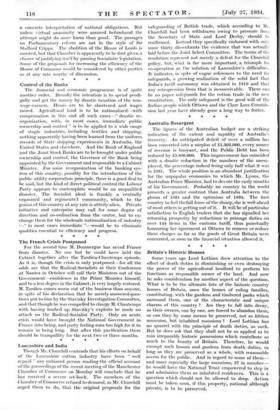Britain's Historic Houses Some years ago Lord Lothian drew attention
to the effect of death duties in diminishing or even destroying the power of the agricultural landlord to perform his functions as responsible owner of the land. And now he asks consideration for another aspect of the question. What is to be the ultimate fate of the historic country houses of Britain, once the homes of ruling families, constituting, with the gardens and timbered parks which surround them, one of the characteristic and unique charms of this country ? Are they to fall into decay, as their owners, one by one, are forced to abandon them, or can they by some means be preserved, not as lifeless museums, but inhabited mansions ? Lord Lothian has no quarrel with the principle of death dutieS, as suet'. But he does ask that they shall not be so applied as to ruin irreparably historic possessions which 'contribute so much to the beauty of Britain. Therefore, he would exempt such houses and gardens from death duties, so long as they are preserved as a whole, with reasonable access for the public. And in regard to some of theria- and more especially the large mansions, 57 in number— he would have the National Trust empowered to step in and administer them as inhabited residences. This is a question which should not be allowed to drop. Action must be taken soon, if this property, ,national although private, is to be preserved.


































 Previous page
Previous page